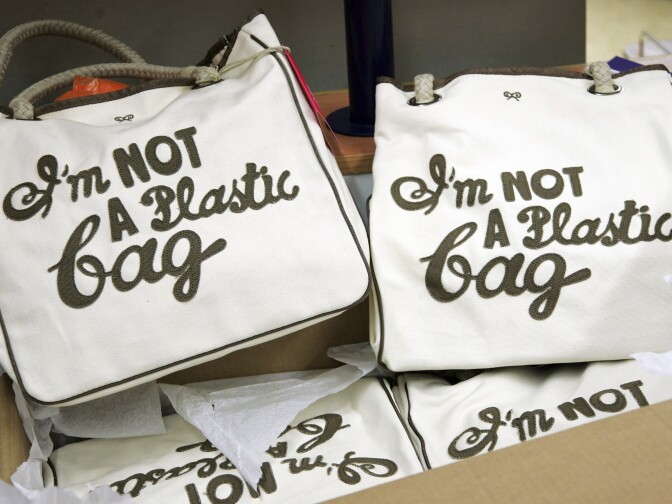This story is free to read because readers choose to support LAist. If you find value in independent local reporting, make a donation to power our newsroom today.
This archival content was originally written for and published on KPCC.org. Keep in mind that links and images may no longer work — and references may be outdated.
Plastic bag ban: Reusable totes are a mixed bag of health hysteria (Poll)
L.A. has outlawed the plastic bag, and a plan for statewide banishment is in the works. About 90 communities in California are now bringing reusable bags to go shopping, but... are they washing them? Studies suggest — in no uncertain terms — no. No they are not. But this is not necessarily a public health crisis.
At worst, what we seem to have on our hands (which should be washed regularly) is a crisis of common sense. The research does tend to point to a need for increasing public awareness. If not properly disinfected, reusable bags do hold the potential for cross-contamination and illness. But following a few basic precautions can dramatically reduce the risk that your stomach becomes the thing going green.
Bags harbor all sorts of lifeforms, from harmless to hostile and hellbent on gastrointestinal destruction. Think about it. Runoff from raw meat trickles into the corners of your carryall where it conspires with baby potatoes and then the next thing you know there's a feast of Noroviruses and E coli for dinner. B.Y.O.Bacteria.
And storing the bags in the trunk of the car, while worthy of a gold star for planning ahead, actually makes matters worse when certain germs are present. Higher temperatures can cause pathogens to fester faster.
A 2010-2011 "Assessment of the Potential for Cross-contamination of Food Products by Reusable Shopping Bags" by researchers at the University of Arizona and the Loma Linda University School of Public Heath found, not shockingly:
When meat juices were added to bags and stored in the trunks of cars for two hours, the
number of bacteria increased 10-fold.
The research study – which randomly tested reusable grocery bags carried by shoppers in Tucson, Los Angeles and San Francisco – also found consumers were almost completely unaware of the need to regularly wash their bags.
Bacteria was found in 99 percent of the tested bags, nearly all of which were made of woven polypropylene. Half carried coliform bacteria; eight percent carried E. coli; and 75 percent of interviewees said they didn’t carry separate bags for meats and for vegetables.
"Bacteria levels found in reusable bags were significant enough to cause a wide range of serious health problems...The study also found that awareness of potential risks was very low.
Overall, Consumer Reports' food-safety experts were markedly less alarmed — underwhelmed, even — by the studies and the type of germs the study turned up, adding, "A person eating an average bag of salad greens gets more exposure to these bacteria than if they had licked the insides of the dirtiest bag from this study."
They did agree that it's easy to spread bacteria from meat, fish or poultry to other foods and supported separating those items and carrying them in disposable bags.
Ryan Sinclair, a co-author of the Loma Linda study, says the public health concern isn’t limited to cross contamination inside the bag — there’s also a potential issue with contamination from the germy, outside world.
USA Today reports on Sinclair's not-yet-published study, which traces pathogens as they spread through a grocery store via reusable bags. The research was conducted in 2013 at a central California grocery store where bags were sprayed with a bacteria that’s not harmful to humans but is transported in a similar manner to Noroviruses.
The contamination cycle, he found, often began right after shoppers entered the store and put their bags in the main section or the baby carrier shelf of a shopping cart. "The baby carrier portion of the grocery cart is the most contaminated public surface you ever come in contact with," he said.
In the study, high concentrations of the tracer bacteria were detected on shopping carts, at the checkout counter and on food that shoppers touched and then put back or left on the shelf.
FoodSafety.gov has common sense tips about keeping reusable grocery bags clean while going green:
- Always put raw meats into a disposable plastic bag before putting them in a reusable bag.
- A disposable plastic bag helps contain any juices that drip off of raw meat packages, which can touch other foods and contaminate them.
- Disposable plastic bags are usually available in the raw meat or produce areas of your store.
- Throw away disposable plastic bags used for raw meat immediately after use.
- Never reuse bags that contained raw meat or poultry.
- Keep meats, fresh produce, and ready-to-eat foods separated.
- It’s also a good idea to keep these foods separated in your shopping cart, at the checkout line on the conveyor belt, and at home. This will help reduce cross-contamination.
- Remember that cold food needs to be refrigerated within two hours of leaving the store or market.
- Cold food should be refrigerated within one hour when temperatures outside are above 90 degrees.
- Store reusable bags at home in a cool, dry place, not in the car.
POLL
BE HEARD | TAKE OUR POLL "Do you wash your reusable bags?
KPCC's online polls are not scientific surveys of local or national opinion. Rather, they are designed as a way for our audience members to engage with each other and share their views. Let us know what you think on our Facebook page, facebook.com/kpcc, or in the comments below.










